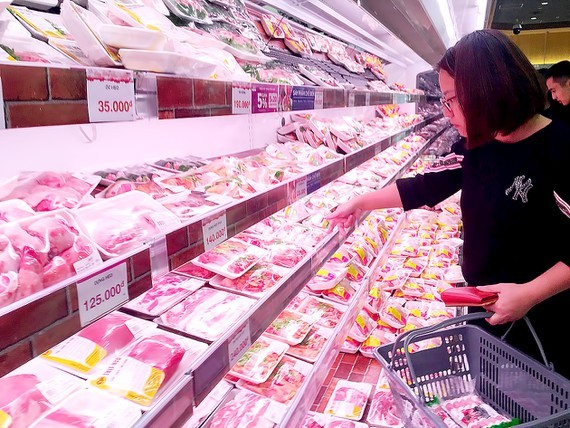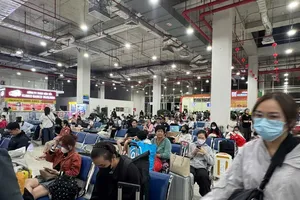
The department sent a report to the city’s People’s Committee on the market situation and solutions to stabilize the price of pork from now to lunar New Year. according to the report of the department, the price of pigs in the South is currently at high level, fluctuating from VND80,000 to VND83,000 per kilogram, doubling compared to that at the beginning of September this year. the main reason for an increase in the price of pigs is decreasing supply as the epidemic has seriously damaged pig raising activity of households, causing a sharp drop in total pig herd.
High pork prices have made total pork consumption in the market decline about 20 percent, of which modern distribution channels saw a slight reduction while traditional markets saw a sharp fall of around 30 percent due to concerns over quality of meat at traditional markets. Pork consumption at stores in the price stabilization program, such as Saigon Co.op, Satra and Vissan, increased thanks to stable prices, ensured quality and traceability. Consumption of other products, such as poultry meat and vegetables rose by 10-15 percent as they replaced pork and their prices were stable.
The city also encouraged enterprises to increase import of frozen pork from countries and territories that are qualified to export pork and pork products into Vietnam. From the beginning of this year to December 10, the amount of frozen pork imported through the city reached 13.231 tons, an increase of 7,130 tons, or 117 percent over the same period last year. All terrestrial animal products, including pork before importing into Vietnam must be carried out animal quarantine procedure. The Department of Veterinary under the Ministry of Agriculture and Rural Development is in charge of doing this procedure. However, as consumers still prefer fresh pork to frozen pork, currently, frozen pork is mainly provided for food processing activity, restaurants and kitchens instead of directly providing to consumers.
In order to stabilize and ensure supply of pork from now to lunar New Year, the department proposed the city’s People’s Committee to keep the pork price in the Price Stabilization Program that was announced by the Department of Finance on November 13 unchanged and make proposal to central agencies to have a policy to increase import of frozen pork and pigs from neighboring countries which have not infected by the African swine fever or have been able to control the epidemic, at the same time, have a policy to lower import tariffs or give tax exemption for imported frozen pork during this time.
The department also proposed the municipal People’s Committee to instruct the Department of Information and Communications to propagandize people about increasing use of imported frozen pork to replace fresh pork or use alternative food, including poultry meat, poultry eggs and aquatic products, such as shrimps, crabs and fish.
High pork prices have made total pork consumption in the market decline about 20 percent, of which modern distribution channels saw a slight reduction while traditional markets saw a sharp fall of around 30 percent due to concerns over quality of meat at traditional markets. Pork consumption at stores in the price stabilization program, such as Saigon Co.op, Satra and Vissan, increased thanks to stable prices, ensured quality and traceability. Consumption of other products, such as poultry meat and vegetables rose by 10-15 percent as they replaced pork and their prices were stable.
The city also encouraged enterprises to increase import of frozen pork from countries and territories that are qualified to export pork and pork products into Vietnam. From the beginning of this year to December 10, the amount of frozen pork imported through the city reached 13.231 tons, an increase of 7,130 tons, or 117 percent over the same period last year. All terrestrial animal products, including pork before importing into Vietnam must be carried out animal quarantine procedure. The Department of Veterinary under the Ministry of Agriculture and Rural Development is in charge of doing this procedure. However, as consumers still prefer fresh pork to frozen pork, currently, frozen pork is mainly provided for food processing activity, restaurants and kitchens instead of directly providing to consumers.
In order to stabilize and ensure supply of pork from now to lunar New Year, the department proposed the city’s People’s Committee to keep the pork price in the Price Stabilization Program that was announced by the Department of Finance on November 13 unchanged and make proposal to central agencies to have a policy to increase import of frozen pork and pigs from neighboring countries which have not infected by the African swine fever or have been able to control the epidemic, at the same time, have a policy to lower import tariffs or give tax exemption for imported frozen pork during this time.
The department also proposed the municipal People’s Committee to instruct the Department of Information and Communications to propagandize people about increasing use of imported frozen pork to replace fresh pork or use alternative food, including poultry meat, poultry eggs and aquatic products, such as shrimps, crabs and fish.
























